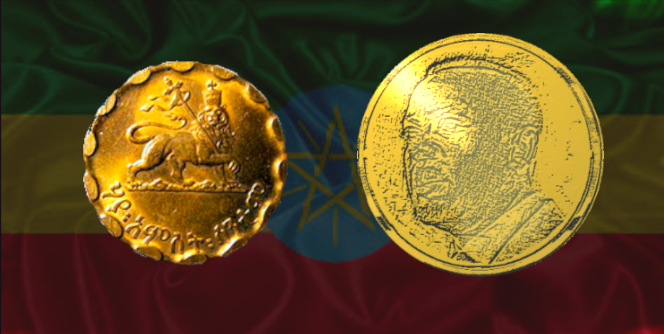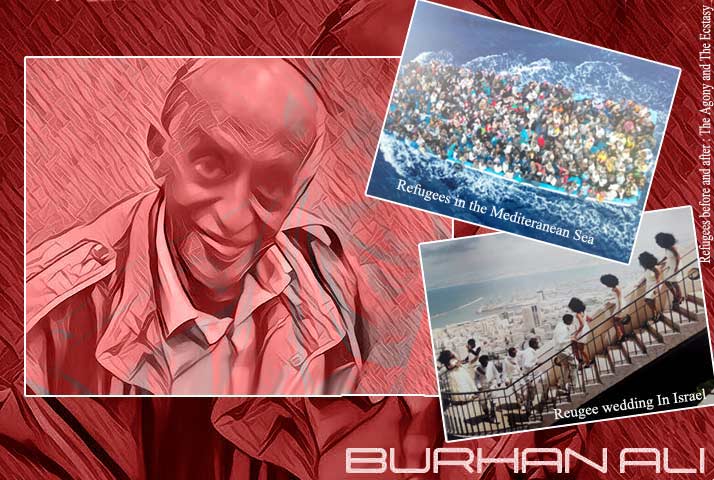A Testimony On Milkias
 Milkias is special when it comes to exposing the tyrannical regime’s brutal nature and cruel treatment of its own people. He is not saying it only now, when everybody has taken it as a fashion to write and talk about it, but long time ago, right in the middle of Asmara while Shaebia was enjoying tremendous support of a vast sections of the Eritrean society.
Milkias is special when it comes to exposing the tyrannical regime’s brutal nature and cruel treatment of its own people. He is not saying it only now, when everybody has taken it as a fashion to write and talk about it, but long time ago, right in the middle of Asmara while Shaebia was enjoying tremendous support of a vast sections of the Eritrean society.
Once we were right in the middle of Guzo Egri (a military walk of one month before you complete your military training in that slavery camp called Sawa). Milkias heard on the BBC news that Eritrean forces invaded the two islands of Hanish and Zuker. He was the one who broke the news in the middle of Etaro to everybody, including those who were leading the walk (guzo)—in some harsh place in Sahel. What he got was an empty stare from the veteran combatants and a bit of worry and bewilderment from the rest. We were all worried that the regime would take us straight to the battle front. Ironically, the Eritrean state media was quit about it.
Later on we were talking about it, and what the incident means for Eritrea. Milkias rightly said that the man (Isaias) is mad and would put the country into more wars in an effort to be an important regional power. Milkias predicted that if Isaias can get away easily with this war against Yemen, he would ignite a war with his friends, the Weyane of Ethiopia, in the coming five years. Some of our friends felt angry and accused him of being unpatriotic. This was towards the end of 1995, or early 1996. Fortunately, Milkias has a way of putting things in a joking manner, therefore, no one took the matter seriously. Luckily, all those around us were our class mates in the camps and they knew Milkias for long time that they wouldn’t give him away. However, his prediction materialized in less than three years. In hindsight, Milkias was even generous in giving the regime five years to start a war, their madness was worse than his prediction.
Milkias is not expressing his frustration and anger with the arrest of Muslims and other minority groups in Eritrea just now; I’am a witness that Milkias was always questioning, unlike many others, why the government was arresting Muslims, and that it was not right to do so without due process of the law. He was sympathetic to those who found themselves at the wrong end of Sheabia’s brutality. That is why he was respected by the Muslims of Akria—ewaay esiz t’uoy, lebam kistanay (he is a good hearted Christian) they used to say.
He was openly saying, among close friends, that the system was treating all minority groups harshly and that the future of the country would not be bright unless they changed course.
One time around May 1999, soon after the second invasion, (as it is known in Eritrea) we were having coffee with Milkias in the town center of Asmara. We were watching people talking and dancing about Hade Lebi, Hade Hzbi mantra. That was the dancing euphoria after two or three months of bloody war where Eritrea lost thousands of youth and a big territory in its western front. I asked with frustration, ‘what is going on, and how is it that so many people are so blinded and can’t see the truth?’ He come up with another prediction; and I hope that prediction would not materialize. He said, “Mastery [a word he addresses his friend with], you see, Yugoslavia was like that a year before it disintegrated; don’t be surprised if you see the same in this country in few years time.” He added, “the way they are handling social grievances and the fact that they refuse to open up politically, bundled with the wars the regime is waging around the region, the country would definitely stretch to a breaking point. As a consequence, it wouldn’t be out of imagination to see ethnic groups fighting for their rights as the state becomes weaker and would be unable to maintain unity by force.” He also said, “don’t be fooled by this, the country is in danger and our intellectuals are more than happy to please the man (Isaias) than address the real issue that the country faces.”
This was Milkas Mehretab in 1999, and long before that. Milkias’ anger and frustration about ethnic oppression grew more after what he saw in Sawa military camp. He used to say that the minorities were treated harshly than the rest; he watched them been beaten for not understanding orders given to them by a language they barely understood. Such comments were popular among Muslim compatriots who were very much afraid to speak for fear of the consequences—one would be accused of being a Jihadist or hamshay mesr’e (fifth columnist). But to see such comments coming from a Christian was a rarity in those days. That is why Milkias stands tall on that. He was the only one who spoke against it as far as I know. This is not, however, to suggest that there were not others who thought like him, but I haven’t seen any as vocal and loud as Milkias was at that time.
Milkias was known around the camps walking while holding Newsweek and Time magazines, or Arab News newspaper, or the Amharic Reporter, and others, and sharing and encouraging people to read them. At times if you offer to buy him coffee or tea, he would ask you to buy him a newspaper instead.
In short, Milkias was opposing the regime right in the heart of Asmara, long before the franchised opposition groups of today. Some of today’s opposition groups were accusing him of being unpatriotic and a CIA agent and were dancing to the tunes of the regime.
What he wrote today is what he was advocating long time ago. What he wrote today wouldn’t change the crimes committed against those he mentioned in his article. What he wrote today, however, would go a long way to ease the frustration and anger felt by Muslims across the country. Coming from a good Eritrean Christian, it would give hope for those who feel they are alone in the fight. It is for this that people like Milkias should take a centre stage in the fight against the regime and should not allow our oppressors of yesteryears, camouflaged as opposition groups, to take control of it. Milkias and his likes should be given the support from all peace loving Eritreans.
Milkias would obviously come under vicious attack from some Eritrean quarters, yet as usual the truth would come to his rescue. “The truth will set you free,” Milkias, and I have no doubt you would stick to it.
By the way all the families that Milkias mentioned in his article have more or less left the country to different parts of the world, with some vowing not to look back or return. Those who are still there though, always ask about Milkias. They fondly remember those relatively better days and wish him all the best.
The other day I was talking to a friend and he said those days were like Jenna (heaven) compared to the present. He broke my heart when he said, “all of us Eritreans living in the West, are living in Jenna on this earth and our people are condemned to live in Jehanem (hell).” This was how he put it: neskum da ab adunya kelekum indikum Jenna attikum, nhna gn abzi jahnem allena.” This simple statement easily describes life in the Eritrea of today.
And that is why we need to work together, both Muslims and Christians, and all ethnic groups, to bring about a fundamental change and to usher a new era in Eritrea where every voice would be heard without any restraint, a restraint that often comes with the excuse of national unity.
Ramadan Kerim



Awate Forum